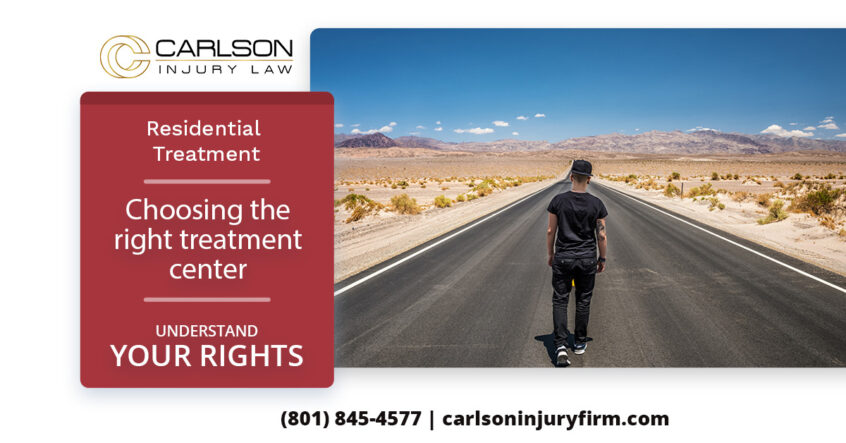Reports of residential treatment center abuse in Utah seem to be in the news regularly these days. With so many reports, it can seem like all treatment centers are abusive. If you have a child or loved one that needs help with substance dependency, how do you choose a center?
At Carlson Injury, we have represented multiple clients in residential treatment center abuse cases. We have seen the signs of abuse and we want to help you avoid experiencing them. That way, you can make an informed decision about getting treatment for your loved one.
Residential treatment centers (RTCs) for teens can provide a range of benefits
First, let’s examine the benefits of a well-run RTC that provides real help for youth.
- Structured and supportive environment: Residential treatment centers for teens offer a highly structured and supportive environment that is designed to help young people recover from emotional, behavioral, and mental health issues. The structure and routine provided by RTCs can help teens develop healthy habits, build self-esteem, and learn coping skills.
- Professional support and therapy: RTCs are staffed by licensed and trained professionals, such as therapists, counselors, and medical staff, who can provide specialized care to teens with a variety of mental health and behavioral issues. These professionals can offer individual and group therapy, medication management, and other evidence-based treatments.
- Safe and secure setting: RTCs provide a safe and secure setting for teens who may be struggling with issues such as addiction, self-harm, or suicidal thoughts. This can help prevent teens from engaging in dangerous behaviors and provide a supportive environment where they can work on their recovery.
- Peer support and socialization: Residential treatment centers offer teens the opportunity to connect with other young people who may be going through similar struggles. This can provide a sense of community and support that may be lacking in their home environment. Teens can also participate in group activities and social events that promote healthy socialization.
- Educational support: Many residential treatment centers offer educational services, such as on-site schooling or tutoring, to help teens stay on track with their academic goals while they receive treatment. This can be particularly important for teens who may have fallen behind in their studies due to mental health or behavioral issues.
There are several reasons why a teen might be in harm’s way while living in a residential treatment center. Here are five possible reasons:
- Abuse or mistreatment by staff: Unfortunately, there have been cases of staff members at residential treatment centers abusing or mistreating residents. This can include physical abuse, emotional abuse, sexual abuse, or neglect. This can be particularly harmful for teens who may have already experienced trauma or abuse in their lives.
- Peer conflicts: Living in close quarters with other teens who are also struggling with mental health or behavioral issues can create a volatile environment. Conflicts between residents can escalate quickly and become violent or abusive.
- Lack of oversight: Some residential treatment centers may not have adequate staff-to-resident ratios or may not have proper oversight in place to ensure the safety of residents. This can lead to situations where teens are left unsupervised or staff.
- Inadequate mental health treatment: If the residential treatment center is not providing adequate mental health treatment, a teen’s symptoms may worsen or they may develop new problems. This can include suicidal ideation, self-harm, or substance abuse.
- Environment or physical safety: Some residential treatment centers may be located in areas that are unsafe or have inadequate safety measures in place. Additionally, the physical environment of the center itself may be hazardous, such as if there are exposed wires or broken equipment that could cause injury.
Avoiding Residential Treatment Center Abuse – Choosing a Treatment Center
1. Check the Salt Lake Tribune’s documentation on violations and inspections.
The Salt Lake Tribune recently released the results of its investigative reporting into residential treatment center abuse in Utah. The documentation is thorough and worth reading for anyone considering a treatment center for troubled teens. Here you can find information about each facility’s violations.
2. Request to take a tour of the facility.
Any reputable treatment center will be willing to take you on a tour of its facility. While you cannot assume that you will see everything that happens day to day, a tour can give you a feel for a center and its staff.
3. Speak to former residents and their families.
This may not always be possible depending on privacy concerns. However, it is worth requesting references from former residents. Some former patients and/or families may have offered to discuss their experiences and give references in hopes of helping others.
4. Verify that the treatments offered are evidence-based.
There is still a significant amount of questionable practices related to substance abuse treatment. Evidence-based treatment is treatment that follows guidelines established through careful study and the resulting evidence.
5. Get a second opinion about the need for residential treatment.
Some children and teens may require residential treatment – where the patient goes and lives at the treatment center. However, many do not require such intensive treatment. Not only is it expensive, but it also is not always the best choice. Seek feedback from more than one medical and/or mental health professional before committing to residential treatment.
We Represent Residential Treatment Center Abuse Victims and Their Families
Carlson Injury is known for its work in the field of residential treatment center abuse law. Our Utah personal injury firm understands the challenges of these types of legal cases. We also know how to overcome those challenges. We fight hard on behalf of our clients and are ready to do the same for you.
Please contact us today at (801) 845-4577 or complete our secure online contact form to speak with our attorney. Let us help you understand your legal options and help you get the compensation you deserve.


